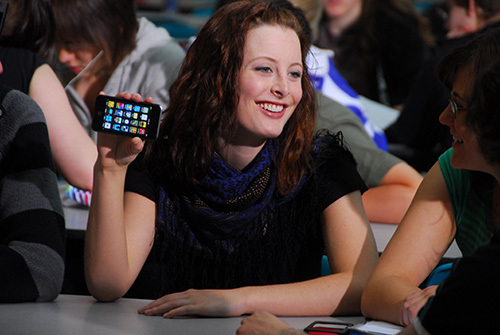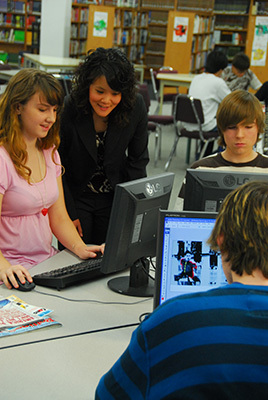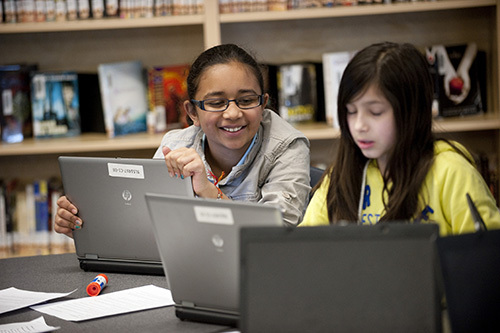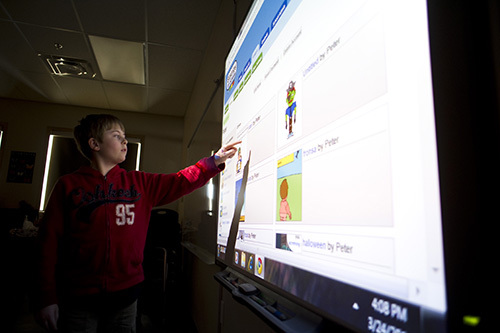
"The power of technology should be harnessed to support innovation and discovery. We envision the move to more digitally-based curriculum will allow for greater flexibility at the local level to support learning at any time, place or pace, as well as the opportunity to continuously improve and refresh programs of study and learning resources."
-- Jeff Johnson
Honourable Jeff Johnson, Minister of Education for Alberta, talked to me last November about his experience as co-chair of the province's pioneering "Inspiring Education" initiative. The question posed by his steering committee to all Albertans was: What kinds of skills and attributes should an educated Albertan graduating in 2030 have? The response, which became the inspiration for education reform in Alberta, was that students needed to be three things: engaged thinkers, ethical citizens, and they needed to have an entrepreneurial spirit. What role has technology played in helping educators achieve these goals? I decided it was time to invite Jeff back to The Global Search for Education series to give us an update.
Prior to his position as Minister of Education for Alberta, Honourable Jeff Johnson was Minister of Infrastructure, Minister responsible for the Oil Sands Secretariat, and Parliamentary Assistant to the Treasury Board. Jeff also has experience working in the financial markets as a futures trading floor pit boss and in building a series of successful small businesses.

"Technology allows teachers to tailor lessons to an inclusive environment - providing visual cues for someone with a hearing impairment, for instance, or tailoring lessons for children with autism." -- Jeff Johnson
How has technology impacted the Alberta education system? What do educators see as the pros and cons from a learning standpoint?
Advances in technology have had a big impact on the world and, as a result, a big impact on our education system as well. Kids today grow up in a world where they have information at their fingertips and education has had to adjust to meet the needs of those students. This is both a challenge and an opportunity for Alberta's educators.
When we talked with Albertans during the Inspiring Education dialogue, one of the main topics of discussion was technology. Albertans told us that we needed to shift from using technology to support teaching to using technology to support the creation and the sharing of knowledge. A part of that is the development of competencies. We are currently shifting Alberta's curriculum towards competency-based learning. That means that instead of memorizing facts, kids today are learning skills. For example, they are learning how to use knowledge to tell fact from fiction online. This is crucial in an age of Wikipedia - kids need to know how to tell if information is credible, a skill that will be important for their entire lives.
The impact of technology on teaching has also been significant. Teachers today use smart boards, so kids can interact with their lessons. They use digital cameras and laptops, so kids can shoot video and make presentations. And technology allows teachers to tailor lessons to an inclusive environment - providing visual cues for someone with a hearing impairment, for instance, or tailoring lessons for children with autism.
How is the role of the teacher changing in the digital age?
Access to technology and information has forced teachers to think differently about how they plan for learning. Teachers not only have to be users of technology and digital resources, but they have to be keenly aware that students need to understand that information in a digital age needs to be validated. Teachers need to shift their thinking from a single answer or source of information to accommodating multiple ways of getting to the answer using a variety of sources of information. It permits students to engage in new knowledge creation in ways that have never been possible before. Teachers are now more accessible to parents than they have ever been in the past, which is also a different paradigm for teachers.

"Teachers need to shift their thinking from a single answer or source of information to accommodating multiple ways of getting to the answer using a variety of sources of information. It permits students to engage in new knowledge creation in ways that have never been possible before." -- Jeff Johnson
Entire states in the US have adopted digital textbooks. University libraries are becoming repositories of digital content. Many would say textbooks have already gone digital and indeed the next generation of digital content is not far behind. What digital learning tools have been implemented in Alberta classrooms and what do educators see as the pros and cons of these?
School authorities are becoming increasingly interested in incorporating technology and digital resources into their classrooms. Through LearnAlberta.ca, Alberta Education has been providing online access to education materials since 2001. This site is host to approximately 8,500 resources. Materials include teaching and learning resources (some in the form of interactive applets and engaging software) that are directly correlated to programs of study, as well as reference materials, and access to online programs of study and assessment materials. LearnAlberta.ca has seen an increase in the use of digital materials for teachers and students following the Alberta programs of study.
In addition, five Alberta school boards are piloting the development of a Collaborative Online Resource Environment (CORE), accessible at http://www.albertacore.ca, to collaboratively acquire, develop, store, manage, and share digital classroom resources for anytime, anywhere learning. To date, students and teachers enjoy shared access over a common infrastructure to over 165,000 digital resources. Users can contribute resources they find of value, and can comment on effective ways they have used these in learning environments. The University of Calgary is conducting formal research on this innovative project.
In Alberta, school authorities have maximum flexibility to determine what kinds of resources they will make available to their students, and what policies they will put in place to guide the use of these resources. Teachers determine for themselves what level of technology use is most appropriate to meet the needs of their students. Whatever resources teachers and school authorities select, equity of access and support for inclusive classrooms will continue to be guiding priorities in those decisions.
Tablets have been found to be extremely helpful in supporting students with unique learning needs - examples include:
- Increasing font size for dyslexic students - helps to de-clutter their vision
- English Language Learners - can use the recording features to see and hear themselves speaking which helps with language acquisition
- Sign 4 Me app - helps to facilitate communication between a deaf student and his classmates

"Through Curriculum Redesign, we are looking at various shifts for curriculum and curriculum development. One of these shifts is to move to a more digitally based curriculum." -- Jeff Johnson
How has technology impacted curriculum design in Alberta?
Through Curriculum Redesign, we are looking at various shifts for curriculum and curriculum development. One of these shifts is to move to a more digitally based curriculum (programs of study, assessments, and learning and teaching resources).
The power of technology should be harnessed to support innovation and discovery. We envision the move to more digitally-based curriculum will allow for greater flexibility at the local level to support learning at any time, place or pace, as well as the opportunity to continuously improve and refresh programs of study and learning resources.

Alberta Education is currently engaged in a research community of practice that is investigating potential uses of technology, including tablet devices, in Kindergarten to Grade 4 classrooms. One of the focuses is to explore what applications of technology are most effective and appropriate for various age groups." -- Jeff Johnson
The latest Pew research once again indicates that the use of tablets, mobile phones, internet sources and social media platforms such as Facebook and Twitter continues to infiltrate classrooms in the US rapidly. Are you seeing the same trend in Alberta classrooms? To what extent is the use of these tools part of your curriculum? Is there an age below which you believe these tools are not appropriate in classrooms?
Alberta is seeing these same trends. We would say that technology is being used appropriately across all grades because in Alberta we have balanced curriculum that includes a balance of learning activities, with technology and other resources, as well as interaction and daily physical activity.
Alberta Education is currently engaged in a research community of practice that is investigating potential uses of technology, including tablet devices, in Kindergarten to Grade 4 classrooms. One of the focuses is to explore what applications of technology are most effective and appropriate for various age groups.
There are several school authorities in Alberta that have invested in class or school sets or portable carts of tablet or laptop devices, like Chromebooks, and interest in educational technology continues to increase throughout the education system. Alberta Education is currently working to finalize an updated Learning and Technology Policy Framework to establish a common vision for technology's role in education, in alignment with Inspiring Education. This vision will help decision makers at all levels take appropriate actions that will complement each other and yield maximum benefit for students.
All photos are courtesy of Ministry of Education Alberta.
In The Global Search for Education, join me and globally renowned thought leaders including Sir Michael Barber (UK), Dr. Michael Block (U.S.), Dr. Leon Botstein (U.S.), Professor Clay Christensen (U.S.), Dr. Linda Darling-Hammond (U.S.), Dr. Madhav Chavan (India), Professor Michael Fullan (Canada), Professor Howard Gardner (U.S.), Professor Andy Hargreaves (U.S.), Professor Yvonne Hellman (The Netherlands), Professor Kristin Helstad (Norway), Jean Hendrickson (U.S.), Professor Rose Hipkins (New Zealand), Professor Cornelia Hoogland (Canada), Honourable Jeff Johnson (Canada), Mme. Chantal Kaufmann (Belgium), Dr. Eija Kauppinen (Finland), State Secretary Tapio Kosunen (Finland), Professor Dominique Lafontaine (Belgium), Professor Hugh Lauder (UK), Professor Ben Levin (Canada), Lord Ken Macdonald (UK), Professor Barry McGaw (Australia), Shiv Nadar (India), Professor R. Natarajan (India), Dr. Pak Tee Ng (Singapore), Dr. Denise Pope (US), Sridhar Rajagopalan (India), Dr. Diane Ravitch (U.S.), Richard Wilson Riley (U.S.), Sir Ken Robinson (UK), Professor Pasi Sahlberg (Finland), Professor Manabu Sato (Japan), Andreas Schleicher (PISA, OECD), Dr. Anthony Seldon (UK), Dr. David Shaffer (U.S.), Dr. Kirsten Sivesind (Norway), Chancellor Stephen Spahn (U.S.), Yves Theze (Lycee Francais U.S.), Professor Charles Ungerleider (Canada), Professor Tony Wagner (U.S.), Sir David Watson (UK), Professor Dylan Wiliam (UK), Dr. Mark Wormald (UK), Professor Theo Wubbels (The Netherlands), Professor Michael Young (UK), and Professor Minxuan Zhang (China) as they explore the big picture education questions that all nations face today.
The Global Search for Education Community Page
C. M. Rubin is the author of two widely read online series for which she received a 2011 Upton Sinclair award, "The Global Search for Education" and "How Will We Read?" She is also the author of three bestselling books, including The Real Alice in Wonderland.

